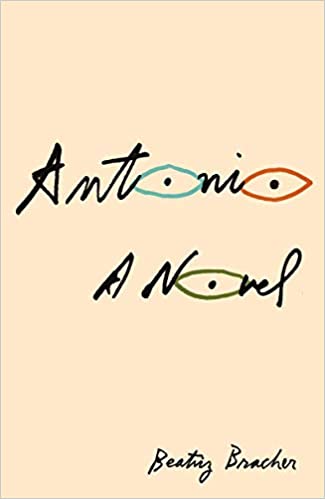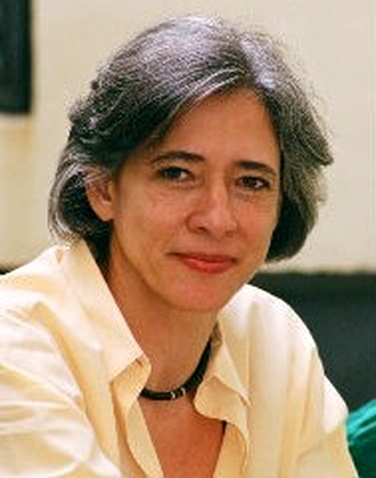Note: Beatriz Bracher has been WINNER of both the Sao Paulo Prize for Literature and the Rio Prize for Literature.
“This isn’t a beautifully intricate novel in which your mother is the hero and I’m the character who picks up the pieces of her broken love. No, Benjamim, the story of our lives still isn’t finished, and it never will be. Creating this space for your mother, this narrative for your father and your grandfather, as though nothing had transpired between one Benjamin and the next, or as though it had only been an echo, a gap, a void between lost love and its reencounter—that’s rather poor….We’re not literature, my dear.”—Raul, who refers to himself as a “professional plagiarist and ghostwriter.”
 In this complex and compressed experimental novel, Brazilian author Beatriz Bracher conveys the secrets and innermost connections of the Kremz family as they live their lives over the course of four generations. Benjamim, addressed in the opening quotation, is the second member of his immediate family to have borne that name – the previous Benjamim, his uncle, having died under circumstances traumatic for the family. Benjamim has never learned all the details of his uncle’s death. All he knows is that it affected those he loved in major ways. Since many of these family members have now passed away, Benjamim has decided to ask family friends who were close to the events and to the people involved to tell him the story of the other Benjamin, to help him understand how his own life might have been different if the lives of those closest to him had been different. Helping him learn about the past and its effects on later events are Isabel, his grandmother, who is still active and important in much of this story; Haroldo, a lawyer, who was the best friend of his grandfather, Xavier; and Raul, a writer who was a classmate and friend of Teodoro, Benjamim’s father. Each has a different slant on the events, the nature of the men who have dominated the action, and the questions in the younger Benjamim’s life.
In this complex and compressed experimental novel, Brazilian author Beatriz Bracher conveys the secrets and innermost connections of the Kremz family as they live their lives over the course of four generations. Benjamim, addressed in the opening quotation, is the second member of his immediate family to have borne that name – the previous Benjamim, his uncle, having died under circumstances traumatic for the family. Benjamim has never learned all the details of his uncle’s death. All he knows is that it affected those he loved in major ways. Since many of these family members have now passed away, Benjamim has decided to ask family friends who were close to the events and to the people involved to tell him the story of the other Benjamin, to help him understand how his own life might have been different if the lives of those closest to him had been different. Helping him learn about the past and its effects on later events are Isabel, his grandmother, who is still active and important in much of this story; Haroldo, a lawyer, who was the best friend of his grandfather, Xavier; and Raul, a writer who was a classmate and friend of Teodoro, Benjamim’s father. Each has a different slant on the events, the nature of the men who have dominated the action, and the questions in the younger Benjamim’s life.
The chapters alternate among the three narrators, with the time periods and the locations also changing as Benjamim seeks answers. As the novel opens, Raul, his father Teo’s friend and one of the narrators, is describing a common statement of Teo, who, whenever asked how many siblings he has, always says, “There are five of us, but one died,” brushing off any further questions on the grounds that “the child died as a baby.” Teo and Raul have been close during their childhood years and have had great fun playing in Teo’s family house in Butantã, a western area of São Paulo which had developed many modernist buildings during the era of his grandfather, a doctor, from whom the family inherited the house. Finances are something of a problem in Teo’s family, however. Xavier, Teo’s father, is a journalist, and, over time, he seems to have exhausted his inheritance; Isabel, Teo’s mother, works as a teacher to help out. Still the house is deteriorating and is “sort of like a bunker.” Life with Xavier, however, has been exciting, according to his wife: “He could turn anything into a gag or a joke, including his own failures,” but eventually, he became “serious,” something that scared the children. It is a confession of Xavier to his son Teo during one of those serious times that becomes a flash point, seeming to dominate much of Teo’s life, just as it did much of Xavier’s life.
Teo had once shared with Raul an important admission his father had made – that he, Xavier, “would always be – before all else – the father of this dead boy, his son Benjamim dos Santos Kremz,” the predecessor of Teo’s son, Benjamim. Friend Raul, who became a writer, then learns that the first Benjamim was the baby of Xavier and Elenir, a fifteen-year-old, not Teo’s grandmother Isabel, and that the birth and death of the infant Benjamim was actually “the story of [his father’s] rebirth, the birth of Xavier the adult, the real Xavier, a delivery in which Xavier the boy had to die.” For Teo, the youngest son of the father’s later family, “It was like we’d taken [baby] Benjamim’s place, without anybody ever saying his name in our home. But in my father’s heart he loomed larger than us all…dead, but alive whenever my father looks at any of us, or at anyone else.”
Many other family surprises are in store for Benjamim, Teo, and the family as the novel progresses in its seemingly random order by time, and their relationships become clearer. Xavier and Teo both have psychological problems, emphasized by their hospitalizations, even against their will, and some powerful episodes follow, including deaths of major characters. Other well-developed episodes include Teo’s abandonment of his parents for a non-academic life as an agricultural worker in Cipó; his grandmother Isabel’s decision to go to college when her children by Xavier are still young; the beginning of the dictatorship in Brazil; the story of the birth of the second Benjamim; and Teo’s relationship with Benjamim’s mother. These fill the narrative and, in most cases, illustrate that “the past [is] once more denied, erased.” In a revelatory scene Teo sits under an ipê tree and remembers a scene from when he was a six-year-old school child, waiting for his mother come pick him up at school. He is alone except for a a woman sweeping when he makes the “stupendous” discovery that “It’s not only a difference of perception….things remain the same without our presence.”
In a great, but understandable, irony, author Beatriz Bracher entitles this novel Antonio, honoring the unborn child expected by Benjamim, and marking the beginning of a new generation. Antonio is the only member of the family who has no past, a clean slate on which his father Benjamim will have an effect. Mentioned casually by Isabel at the not-quite halfway point of the novel, Antonio remains undeveloped as a character. Isabel has learned the hard way that one can never predict how an individual will behave over his lifetime, given that every individual is always subject to his/her past, and the past is always different for each of the participants, even when they share the same events. Author Beatrtiz Bracher has written a complex narrative of relationships, not just on the personal level, but also on the level of family, generations, class, and history.
Photos. Paolo Mendes da Rocha, one of Brazil”s great architects of the 1950 – 1970 era and onward built this Butanta house in 1964, and it may have resembled that of the Kremz family when Teo and Raul were children. https://www.pinterest.com
Teo disappeared into the rural fields of Cipó when he was a late teenager, working as a farm worker: https://www.alamy.com
Teo has a revelatory moment as a child sitting under an ipê tree outside his school. http://tropical.theferns.info
The author’s photo appears on https://filmow.com/beatriz-bracher




